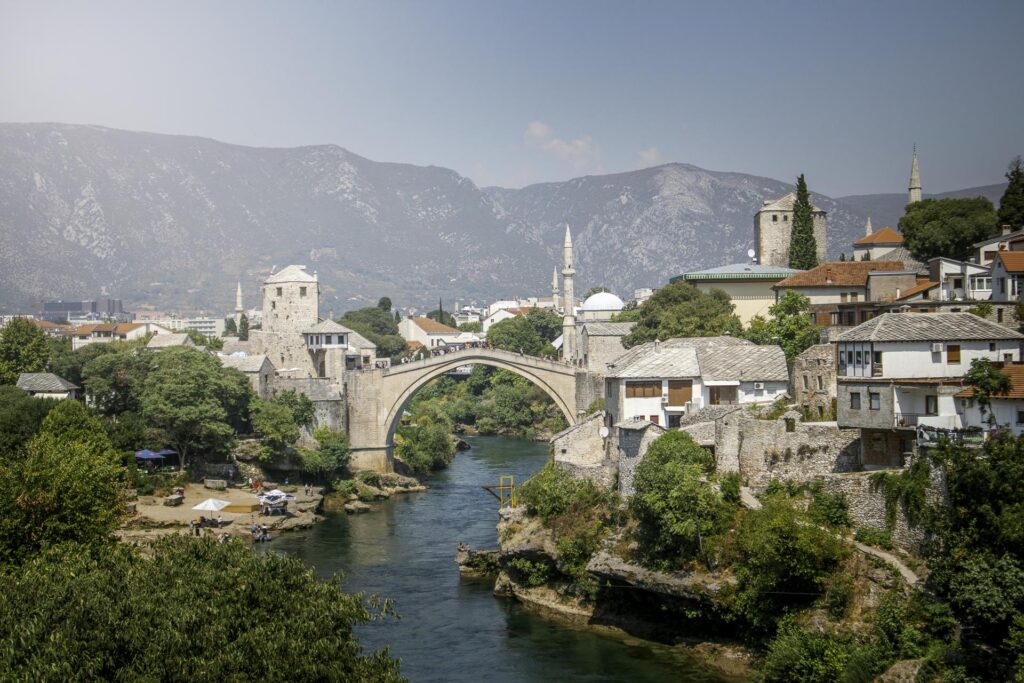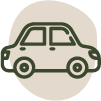VISIT ALBANIA
With rugged mountains, crystal-clear beaches, and a rich cultural tapestry still largely untouched by mass tourism, Albania is Europe’s best-kept secret for adventurous souls on a budget.
Currency
ALL - Albanian Lek (1ALL≃ 0,01€ ≃ 0,012$ ≃0,09£)
POPULATION
2,4 millions
MAIN LANGUAGES
Albanian
AREA
28,748 km²
TIME ZONE
UTC+1 / UTC+2
FLAG
🇦🇱
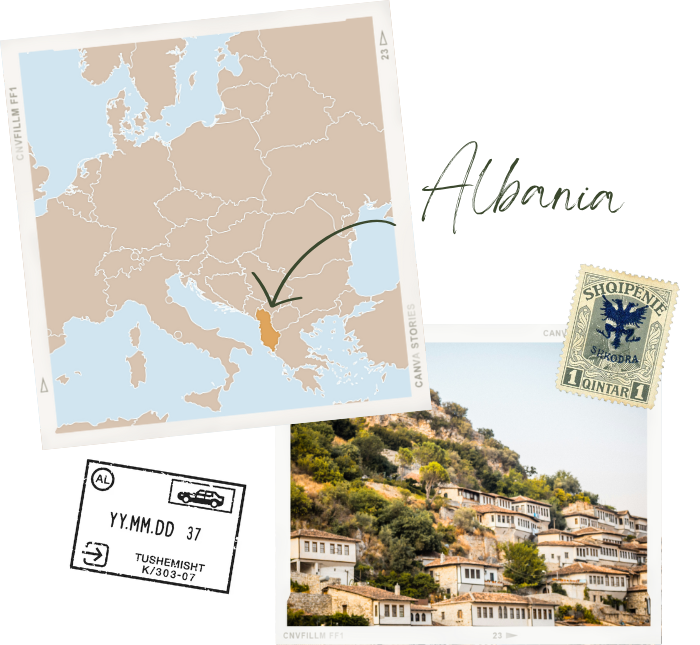
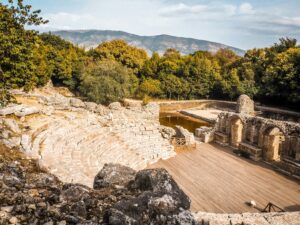
VISIT THE RUINS OF BUTRINT
Once a Greek, then Roman, then Byzantine city, Butrint is one of the country’s most significant archaeological sites which lies in a lush national park.
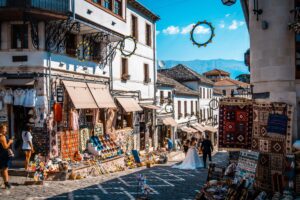
EXPLORE THE STONE CITY
Another UNESCO gem, Gjirokastër is known for its unique stone-roofed houses, steep cobbled streets, and the hilltop fortress that dominates the skyline.
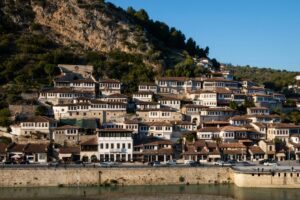
WANDER THROUGH THE CITY OF A THOUSAND WINDOWS
A UNESCO World Heritage Site, Berat is famous for its Ottoman-era houses stacked along the hillsides and its impressive hilltop castle with sweeping valley views.
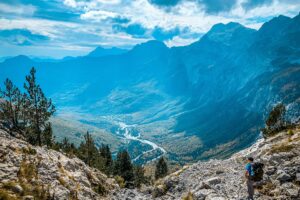
HIKE IN THE ACCURSED MOUNTAINS
Also known as the Albanian Alps, this dramatic region is a dream for hikers. The trail from Valbona to Theth is among the most scenic in the Balkans.
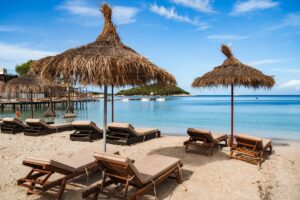
RELAX ON THE ALBANIAN RIVIERA
With turquoise waters, hidden coves, and charming coastal towns like Himarë and Dhërmi, the Albanian Riviera is perfect for a beach break without the crowds.
Pick an Albanian destination

Tirana
Capital of Albania, lively and colorful, mixing communist relics with modern flair.
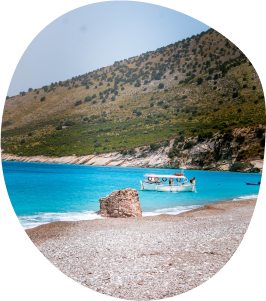
Sarandë
Coastal town on the Ionian Sea, gateway to beaches and the nearby site of Butrint.
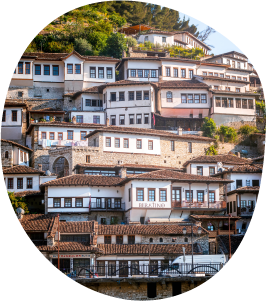
Berat
UNESCO-listed “City of a 1000 Windows”, known for its Ottoman houses.
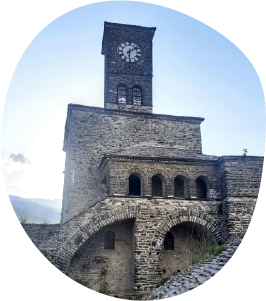
Gjirokastër
Stone-built hill town with Ottoman charm, castle views, and rich historical heritage.
All articles about Albania
Prepare your trip to Albania
💡 Why visit Albania?
Albania is an underrated gem that surprises visitors with its stunning natural landscapes, rich history, and warm hospitality. From the turquoise beaches of the Albanian Riviera to the Ottoman towns like Gjirokastër and Berat, there’s plenty to explore. Despite being lesser-known, it offers great value and fewer crowds than other European destinations. Must-see highlights include the ancient ruins of Butrint, the beaches of Ksamil, and the capital city Tirana, known for its colorful buildings and lively café culture.
🪪 Do I need a visa to visit Albania?
Citizens of the EU, USA, Canada, Australia, and many other countries can enter visa-free for up to 90 days within a 180-day period. However, some nationalities do require a visa. It’s best to check with the nearest Albanian embassy or consulate for the most up-to-date information specific to your situation.
IMPORTANT NOTE: The information below is provided merely as an indication and applies for short-term tourism visa purposes only. Before your trip to Albania, or if you are planning to come to Albania for another purpose (work, studies, …), check the official information on the Albanian visa application website: https://www.e-visa.al/
⏳ Visa-free but limited to maximum 90 days for a period of 180 days if you are a citizen of one of the following countries: Andorra; Antigua and Barbuda; Argentina; Australia; Austria; Bahamas; Bahrain; Barbados; Belgium; Bosnia and Herzegovina; Brazil; Brunei; Bulgaria; Canada; Chile; China; Colombia; Costa Rica; Croatia; Cyprus; Czechia; Denmark; Dominica; El Salvador; Estonia; Finland; France; Georgia; Germany; Greece; Grenada; Guatemala; Honduras; Hong Kong; Hungary; Iceland; Ireland; Israel; Italy; Japan; Kiribati; Kuwait; Latvia; Liechtenstein; Lithuania; Luxembourg, Macao; Malaysia; Malta; Marshall Islands; Mauritius; Mexico; Micronesia; Moldova; Monaco; Montenegro; Netherlands; New-Zealand; Nicaragua; North Macedonia; Norway; Oman; Palau; Panama; Paraguay; Peru; Poland; Portugal; Qatar; Romania; Saint Kitts and Nevis; Saint Lucia; Saint Vincent and the Grenadines; Samoa; San Marino; Serbia; Seychelles; Singapore; Slovakia; Slovenia; Solomon islands; South Korea; Spain; Sweden; Switzerland; Taiwan; Timor-Leste; Tonga; Trinidad and Tobago; Turkey; Tuvalu; United Arab Emirates; United Kingdom; United States of America; Uruguay; Vanuatu; Vatican; Venezuela
⏳ Visa-free but limited to a maximum of 30 days if you are a citizen of one of the following countries: Russia; Ukraine
🛂 Visa required if you are a citizen of one of the following countries: Afghanistan; Algeria; Angola; Armenia; Azerbaijan; Bangladesh; Belarus; Belize; Benin; Bhutan; Bolivia; Botswana; Burkina Faso; Burundi; Cambodia; Cameroon; Cape Verde; Central African Republic; Chad; Comoros; Congo; Congo (Dem. Rep); Cote d’Ivoire (Ivory Coast); Cuba; Djibouti; Dominican Republic; Ecuador; Egypt; Equatorial Guinea; Eritrea; Eswatini; Ethiopia; Fiji; Gabon; Gambia; Ghana; Guinea; Guinea-Bissau; Guyana; Haiti; India; Indonesia; Iran; Iraq; Jamaica; Jordan; Kazakhstan; Kenya; Kosovo; Kyrgyzstan; Laos; Lebanon; Lesotho; Liberia; Libya; Madagascar; Malawi; Maldives; Mali; Mauritania; Mongolia; Morocco; Mozambique; Myanmar; Namibia; Nauru; Nepal; Niger; Nigeria; North Korea; Pakistan; Palestinian territories; Papua New Guinea; Philippines; Russia; Rwanda; Sao Tome and Principe; Saudi Arabia; Senegal; Sierra Leone; Somalia; South Africa; South Sudan; Sri Lanka; Sudan; Suriname; Syria; Tajikistan; Tanzania; Thailand; Togo; Tunisia; Turkmenistan; Uganda; Uzbekistan; Vietnam; Yemen; Zambia; Zimbabwe
⛅ When is the best time to visit Albania?
❄️ December – February: Winters are mild along the coast but colder inland and in the mountains, where snow is common. It’s the quietest season for tourism, but perfect if you’re seeking solitude or want to explore cities like Tirana and Gjirokastër without the crowds.
🌱 March – May: Spring is one of the best times to visit Albania. Nature is in bloom, temperatures are pleasant, and the beaches are still peaceful. Unfortunately, hiking in places like the Accursed Mountains may still be unaccessible at that time of the year.
☀️ June – August: Summer is hot and sunny, especially along the Albanian Riviera, where temperatures can reach up to 35°C (95°F). The beaches of Ksamil, Himarë, and Dhermi are at their liveliest. Be sure to book accommodation in advance during this high season.
🍂 September – November: Autumn offers warm temperatures and fewer tourists, making it ideal for cultural exploration and outdoor adventures. The sea is still warm enough for swimming through September, and the fall colors add charm to the countryside.
🚉 How to get around Albania?
Getting around Albania is relatively straightforward, with several options available:
🚌 Buses and Minibuses (Furgons): The most common and affordable way to travel between cities and towns. Furgons don’t always follow fixed schedules, but they are frequent and can be flagged down along main roads. Intercity buses operate from terminals in major cities like Tirana, Shkodra, and Saranda.
🚂 Trains: Albania’s railway network is limited and not as practical as buses due to infrequent service and limited lines. For updated information, check the HSH (Albanian Railway) website.
🚗 Car Rental: Renting a car gives you the most flexibility, especially for reaching remote beaches or mountain villages. The road network has improved in recent years, but driving can be a bit chaotic. An International Driving Permit (IDP) is recommended if your license is not in Latin script.
💳 Can I use bank cards or cash for payments in Albania?
Cash is king in Albania, especially in small towns and rural areas. In larger cities and tourist hotspots, debit and credit cards are accepted in hotels, supermarkets, and some restaurants. Visa and Mastercard are the most widely accepted. It’s always good to carry some cash in Albanian lek for taxis, small eateries, and markets.
🔌 What type of plugs and voltage does Albania use?
Albania uses two plug types: C and F. They both have two grounding holes. Albania operates on a 230V supply voltage and 50Hz frequency.
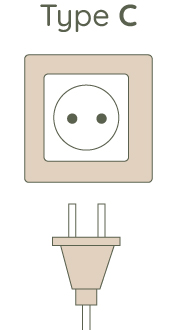
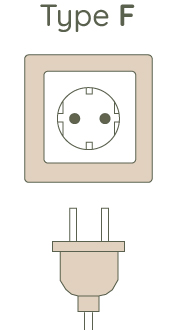
If needed, you can order an universal travel plug adapter here.
🪙 Is tipping customary in Albania?
As a general rule – although not mandatory – a tip of around 10% is appreciated in restaurants and cafés in Albania if you are satisfied with the service.
🥛 Is it safe to drink tap water in Albania?
It’s generally recommended to drink bottled water in Albania, especially for foreigners.
📅 When are public holidays and store closing days in Albania?
Sunday is a closing day for most stores. There are 10 national public holidays in Albania:
- New Year’s Day (January 01-02)
- Summer Day (Dita e Verës) on March 14
- Nevruz Day (Dita e Nevruzit) on March 22
- Catholic and Orthodox Easter (dates vary)
- Labour Day (May 01)
- Mother Theresa Day (Dita e Nënë Terezës) on September 05
- Independence Day (Dita e Pavarësisë) on November 28
- National Youth Day (December 08)
- Christmas Day (December 25)
On these days, most businesses and offices will be closed, and many attractions may be shut or have limited opening hours.
🚦 What are the speed limits in Albania?
In Albania, traffic drives on the right-hand side of the road. The main speed limits are as follows:
- 40 kph / 25 mph on main roads within built-up areas
- 80 kph / 50 mph on main roads outside built-up areas
- 90 kph / 56 mph on dual carriageways
- 110 kph / 68 mph on motorways.
During adverse weather (rain, fog, etc.), the speed limits are lowered.
💬 What are some basic Albanian words I should know?
- Hello (informal) = Tung
- Hello/Good day = Mirëdita
- Goodbye = Mirupafshim
- Yes = Po
- No = Jo
- Thank you = Faleminderit
- Please = ju lutem
- You’re welcome = S’ka përse
- Excuse me = Më falni
- Day = Ditë
- Night = Natë
- Good evening = Mirëmbrëma
- Goodnight = Natën e mirë
- Mister = Zoti
- Ma’am = Zonja
- Street/Road = Rrugë
💡 Tip: With the GoogleTranslate app, you can download the Albanian language to use it even offline!
🛡️ Is it safe to travel in Albania?
Traveling in Albania is generally considered safe. The country is popular with tourists for its natural beauty, historical sites, and cultural experiences. However, it’s always wise to take standard safety precautions:
- Secure Your Belongings: Keep an eye on your personal items and avoid displaying valuable possessions.
- Emergency Numbers: If you’re traveling with a mobile phone, you can dial the European emergency number, 112, which will connect you to the local emergency services.

